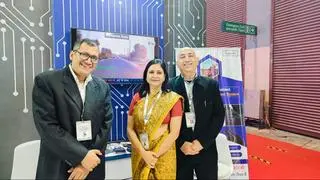He comes with 15-year experience in the banking and finance industry, especially on payments and technology, and is trying to transform the way the chit fund industry in India is run. Sidd Gandhi, 38, is convinced that technology can help transform the way chit fund companies – one of the oldest forms of group savings and borrowing – run their business, moving beyond their traditional customer base and bringing in newer and younger generation customers into their fold.
After working abroad, predominantly in the UK, Sidd, an engineering graduate from Nagpur with an executive MBA from London, wanted to return to India. “My interest was India and financial inclusion was a part of that,” says Sidd. His research thesis was on how alternative digital models can have a positive impact on financial inclusion in India, as part of which he spent two months in India and got in touch with people in the micro-finance and chit funds space. That gave him in-depth knowledge of the problems in the chit fund industry. It set him thinking on what could be done from a technology standpoint to transform the industry.
Leveraging the technologyDuring his interaction with chit fund industry players, many of whom had been in business for a few decades, Sidd learnt that there was very little technology being used in the industry and that customers had stayed with the firms for generations and that there were not too many younger generation or new customers coming in.
“It started with my thesis and I got so passionate about it and I saw that I have my expertise in technology,” says Sidd, on why he decided to take the plunge and do something using technology for the chit fund industry. That was in early 2015, when he started talking about his idea with others and putting in place a team.
This activity, says Sidd, has stayed either stagnant or probably reduced in size because the formal banking system adopted technology and regulations too favoured the formal banking system. Chit fund companies had not embraced technology and still relied on basic accounting software to do business.
Sidd says he decided to make solving this as a mission statement for his venture, KyePot. According to him, Kye in Korean means social trust, which is what the chit fund industry was all about, although the perception about it was different. KyePot, according to Sidd, is a Software-as-a-Service (SaaS) platform that digitises the entire lifecycle of the chit fund, including its subscribers.
It provides the infrastructure for facilitating digital payments by having on board banks. It also allows creating a risk score of the members using various parameters. “This,” says Sidd, “is something the chit fund industry has never done.” Their risk assessment is based on face-to-face meetings.
KyePot, which was part of a fintech accelerator programme in Singapore, has digital marketing and content capability that will help bring in new customers and subscribers too can discover the chit funds. The venture itself took off in end-2015. KyePot earns its money from chit fund companies through a recurring monthly fee per customer. It has got half-a-dozen chit fund companies on board now and is working in Tamil Nadu, Karnataka and Maharashtra.
Looking for fundsKyePot is looking to raise funds from investors that will help it scale up its operations. Apart from his own savings, KyePot raised some funds from friends and family. It has partnered with a pan-African bank to launch the product in Kenya and will shortly offer it in South Africa.
Sidd is confident that KyePot has built enough of a technology moat to meet competition as and when it comes, but feels the bigger challenge is changing the perception of the chit fund industry and getting the chit companies to adopt technology in a big way to help them grow their business and attract younger generation customers.








Comments
Comments have to be in English, and in full sentences. They cannot be abusive or personal. Please abide by our community guidelines for posting your comments.
We have migrated to a new commenting platform. If you are already a registered user of TheHindu Businessline and logged in, you may continue to engage with our articles. If you do not have an account please register and login to post comments. Users can access their older comments by logging into their accounts on Vuukle.